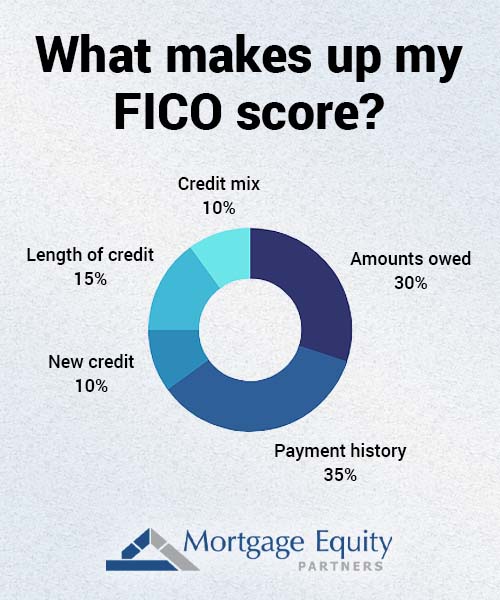
Why do we care about credit scores in the mortgage industry?
First, we care about credit scores because it could mean the difference between approved and denied loan status, and secondly, credit scores may affect the interest rate on a mortgage.
What is a credit score?
A credit score is a number between 300 and 850 that describes an individual’s creditworthiness. Creditworthiness explains how likely one is to repay debts. For example, mortgage lenders use this score to decide how safe it is to lend a borrower money for a home loan.
Typically, borrowers with better credits scores get lower mortgage rates because lenders feel more confident lending to individuals with higher scores. This confidence is also reflected in the mortgage loan programs offered to borrowers with high credit scores.
A FICO score is a term that is often used interchangeably with credit score. It is a 3-digit number based on the information collected from credit reports. Credit reports are compiled by the three major bureaus: Equifax, Experian, and TransUnion. While they all provide free educational credit scores, most lenders will use the FICO score to qualify borrowers. FICO scores are made up of reports from all three Bureaus and are calculated in real-time.
Here are the credit scores ranges according to Experian:
- Low credit score: below 580
- Fair credit score: between 580-669
- Good credit score: between 670-739
- Very good credit score: 740-799
- Exceptional credit score: 800-850

Let’s break that down into sections. First, payment history refers to whether past credit accounts have been paid on time. Payment history is considered the most important component of the FICO score because it assists the lender in determining the likelihood they will be paid back on time should they approve a borrower for a mortgage. Payment history comprises 35% of the FICO score.
How much a borrower owes on existing credit accounts makes up 30% of a FICO score. It does not necessarily indicate that a borrower is high-risk, but it could suggest that one may be over-extended and at a higher risk of not paying back a loan. When a borrower has high credit limits and uses that credit, all it could take is a layoff or slight bump in the road to miss a payment.
15% of the FICO score is calculated based on the length of credit. According to myFICO.com, having a longer credit history has a positive effect but is not required to have a good credit score. Although interestingly, just having accounts doesn’t improve one’s score, it seems that having active accounts over a longer time period is considered a better indicator of creditworthiness.
Credit mix determines 10% of a FICO score. A credit mix refers to credit accounts such as credit cards, retail accounts, installment loans, financing accounts, and mortgage loans. And the last 10% of the FICO score considers the length of credit history. For example, a college student may have credit cards but not a long history of making payments. Also, opening several new accounts over a short time does not improve a FICO score.
There is a lot involved in building and maintaining a strong FICO score. It is important for many things one may want to accomplish in life, especially purchasing a home. While loan officers are not in the business of credit repair, their expertise is valuable for potential borrowers who may want to buy a home in the future. Unfortunately, there is no hack or quick fix to improve a FICO score; it takes time and effort.
FAQs about credit scores
Q: Does checking my credit score lower it?
A: According to myFico.com, checking your credit score does not lower it because it is a soft inquiry.
Q: What is the difference between are hard inquiry and a soft inquiry?
A: You will receive a soft inquiry when pulling your own credit report, which should not affect your credit score. However, pulling a credit report to apply for new credit is considered a hard inquiry.
Hard inquiries may include:
- Apply for a car loan
- Responding to a pre-approved offer of credit from a credit card company
- Applying for a mortgage and authorizing a lender to pull a credit report
Q: What happens when my mortgage lender pulls my credit as part of the application process?
A: A credit inquiry made by a mortgage lender as part of the credit application process will have a small and temporary impact on credit scores.
Q: What if I find something on my credit report that is inaccurate?
A: Anyone who has tried to remove something from a credit report knows the process is complicated and frustrating, even if the item reported is an error on the bureaus’ part. To remove an item, one must contact the big three national credit bureaus – Equifax, Experian, and TransUnion to request the correction directly. Only national credit bureaus can correct errors on credit reports.
Contact one of our loan officers today to learn more about how your FICO score impacts your mortgage application.
Sources:




